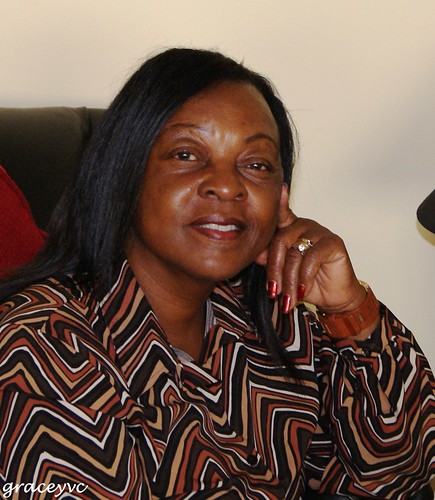
Dr. Hope Sadza is the founder and Vice-Chancellor of Women's University in the southern African nation of the Republic of Zimbabwe. She was recently interviewed in the national Herald newspaper on the status of women in education. a photo by Pan-African News Wire File Photos on Flickr.
Educating women
Saturday, 12 March 2011
17:25
Opinion
PROFESSOR Hope Sadza, the Vice-Chancellor and founder of the Women’s University in Africa, opens up in this interview with our reporter Shamiso Yikoniko.
Question: The theme for this year’s International Women’s Day is “Equal Access to Education Training, Science and Technology”.
What can you say about the theme?
Answer: It is a beautiful theme. We are excited that in the centenary year, we seem to have been targeted. Science and Technology is a challenge that Africa faces as a whole.
Q: What drove you to open this university and why did you name it Women’s University in Africa?
A: Under-representation of women in all spheres of life was the major driving force. When I was a Public Service commissioner, I used to hear women saying that they couldn’t take up certain positions in organisations because they were not qualified.
I then asked myself what could be the reason. I found that they didn’t have time to go to school because of family responsibilities.
They were poor, they had no easy access to resources, they had no role models and mostly as women we don’t believe in ourselves.
This university is a platform where women can come out and prove their abilities.
We have come to an agreement with the Government that our enrolment will be 85 percent women and 15 percent men.
We named it Women’s University in Africa because we wanted people to know that it was for women. It is women who failed to access education when they were young, so now is their time!
Q: The university is called Women’s University in Africa, how far have you gone in terms of enrolling students from the African continent?
A: What Zimbabwean women are facing today is the same almost anywhere in Africa. We have so far enrolled students from Zambia, Namibia, Angola, Botswana, Swaziland, Mali, Malawi and South Africa.
Q: Since the degrees you offer are for mature people, most of which may be working, how have you structured your programmes and lecture delivery to meet the unique needs of your target group of students?
A: Our university is user friendly and we have devised timetables that accommodate every student’s needs. We have lectures from 8am to 5pm and we also have some from 5pm to 7pm and we have block release programmes.
Q: How have you catered for prospective students in other cities and towns in Zimbabwe?
A: I have to agree that we haven’t been fair to students in other parts of the country because 60 percent of our students are from Harare. In September this year, we are opening a campus in Bulawayo.
Q: What are the university’s achievements and challenges to date?
A: So far we have had about 1 500 students who have graduated since the institution opened in 2005.
Most of the students who have graduated are working and some have been promoted in their workplaces.
Our enrolment is growing and we have 78 scholarships.
For the challenges — some of our students fail to come up with tuition and examination fees because they are disadvantaged. We have closed one faculty of reproductive health because of shortage of staff.
Our biggest challenge is that we don’t have Science and Technology because we are not getting enough numbers enrolling for such programmes.
We are encouraging girls and women to start enrolling in Science and Technology and ICT.
Q: The Government of Zimbabwe has encouraged private-public partnerships, have you explored this avenue as a university?
A: Yes, we have. The corporate world should partner us in research and business so that we have a win-win situation.
There is a lot that the corporate world can do to give back to the community. They can adopt students for scholarships. We appreciate our current support, but we still need more.
Q: Where do you see this university in 10 years’ time?
A: I can see it joining the international arena if we continue using our students as ambassadors. I can foresee a better and smooth relationship between my university and the corporate world.
We need to be more expansive because that is what the global village demands of us.
We are looking forward to cross-country campuses around Africa. We are setting up a Gender Centre for Sadc in Marondera which should be officially opened in September this year.
1 comment:
Thanks to women like Dr. Hope Sadza and to women organizations such as Women's Worldwide Web, there is hope for everyone, even women from otherwise "conservative" countries.
Post a Comment